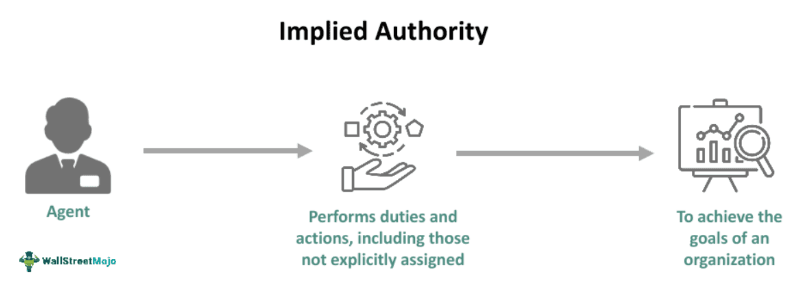Table Of Contents
Key Takeaways
- Implied authority refers to the authority that is not explicitly granted through written or spoken communication but is understood based on the context, actions, or relationships of the individuals involved.
- It is the authority a person might have due to their role or position. Such authority may even be expected of someone in a specific situation, even when it is not explicitly stated.
- Implied authority, apparent authority, and express authority are distinct concepts that define the scope of an agent's power to act on behalf of a principal.
- This form of authority arises from the nature of an agent's role or customary duties in a specific context.
- Apparent authority, on the other hand, emerges from the principal's actions or statements that lead third parties to reasonably believe that an agent has been given certain authority.
- Express authority is the most direct form of authority or power, originating from written or verbal instructions provided to an agent by the principal.
Examples
Let us look at some examples to understand the concept better.
Example #1
Here is a hypothetical scenario. Consider a bookstore where Sarah works as the store manager. Her express authority, as outlined in her job description, involves inventory management, staff scheduling, and customer interactions. One day, a customer approaches Sarah with a rare book and inquires about its authenticity. While her job description does not explicitly mention appraisals, Sarah's position implies a certain level of expertise.
She examines the book, offers insights into its authenticity, and provides an estimated value based on her knowledge. Her action is born out of implied authority, as she makes a decision beyond her explicit responsibilities to address a customer's inquiry, leveraging her role's assumed expertise to provide valuable assistance.
Example #2
Assume Adam is a Registered Nurse (RN) at a renowned hospital in Texas, US. In a medical setting, a Registered Nurse (RN) demonstrates implied authority within the scope of their role. Adam also exercises this authority in situations that demand quick action. He does not seek permission in specific situations, such as dealing with Code Blue (sudden respiratory or cardiac issues).
While doctors have the express authority to diagnose and prescribe treatments, nurses are entrusted with various responsibilities that do not necessarily need explicit permission for every action. For instance, administering medication to patients based on doctor's orders is within their express authority. However, implied authority allows them to take immediate action in emergencies, such as administering CPR, stabilizing a patient in critical condition, or notifying the doctor about critical changes in a patient's health.
Such implied authority is based on the understanding that nurses are trained professionals who can make urgent decisions to ensure patient safety and well-being, even if these specific scenarios are not explicitly outlined in their job descriptions.
Risks
While authority in this form can be beneficial for streamlining decision-making and empowering individuals within organizations, it carries certain risks. These risks have been discussed below.
- Misunderstanding: The lack of explicit clarity can lead to misunderstandings about the extent of implied authority. Individuals might assume they have the authority to take certain actions that actually fall outside the scope of their roles, resulting in confusion and potential conflicts.
- Overstepping Boundaries: Without well-defined boundaries, individuals might overstep their implied authority, making decisions that produce unintended consequences or those that are in direct conflict with the overall objectives of an organization.
- Legal Implications: If an action taken under implied authority results in legal trouble, the organization might be held liable. Determining whether an action was within the reasonable scope of implied authority can be complex and may involve legal challenges.
- Inconsistency: It can lead to inconsistencies in decision-making, as different individuals might interpret their authority differently. It can result in different people dealing differently with similar situations or tasks, introducing inconsistencies within an organization.
- Risk Aversion: Employees might avoid making decisions that fall within the scope of implied authority due to fear of making mistakes or facing repercussions. This could hinder initiative and innovation.
- Lack of Accountability: Since this kind of authority is not always explicitly documented, it might be challenging to hold individuals accountable for their decisions, especially if disputes arise.

